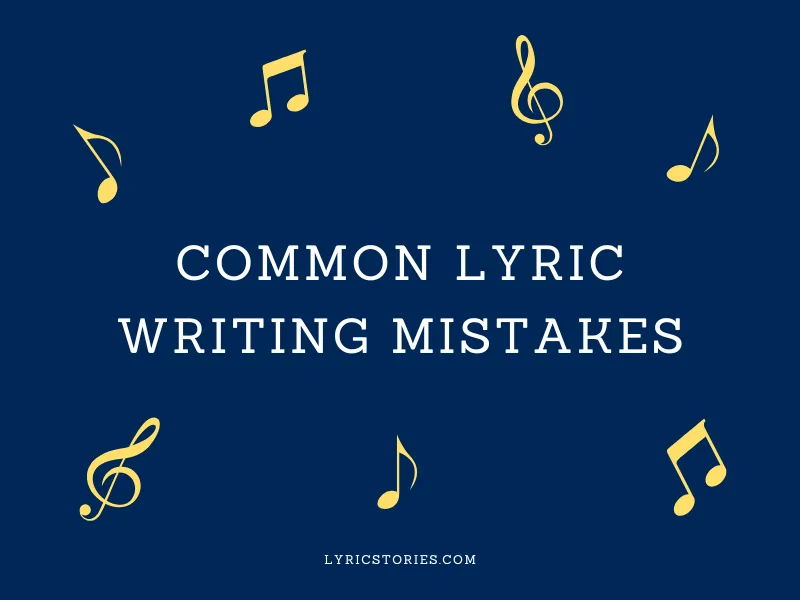Lyric writing is one of the most rewarding aspects of songwriting, but it can also be one of the trickiest. Whether you’re an experienced songwriter or just starting, it’s easy to fall into common traps that can weaken your lyrics. These mistakes, from overused clichés to poor rhyme choices, can hinder the impact of your song.
In this article, we’ll explore some of the most frequent lyric writing mistakes and provide practical tips on how to avoid them. By becoming aware of these pitfalls, you can refine your lyrics and elevate your songwriting to a higher level.
1. Relying on Clichés
One of the most prevalent issues in lyric writing is the overuse of clichés. These are phrases or ideas that have been said so many times that they lose their emotional impact. Lyrics that rely on tired expressions like “love is like a rollercoaster” or “heart of stone” can feel uninspired and fail to connect with listeners on a deeper level.
How to Avoid Clichés
To make your lyrics more original, try to think outside the box. Instead of using familiar phrases, try describing emotions or situations in a new way.
Use metaphors or vivid imagery to convey your message. For instance, instead of “heart of stone,” you could describe someone’s emotional state with a metaphor that’s more personal or unusual.
Take a moment to think about your lyrics and ask yourself: Is this an idea or expression that’s been heard before, or does it feel fresh?
For inspiration and deeper lyric analysis, you can explore the vast collection of lyrics on Genius Lyrics, where you can see how artists approach common themes in unique ways.
2. Poor Rhyme Choices
While rhyme is an essential part of songwriting, choosing poor rhymes can make your lyrics sound forced or awkward. This can happen when you prioritize the rhyme over the meaning, leading to lines that don’t flow naturally or feel out of place.
How to Improve Your Rhymes
To avoid this mistake, make sure the rhyme serves the song’s emotion and context. Instead of settling for the first obvious word that rhymes, take some time to find a word that fits the mood and meaning of the song. For example, if your song is about longing, choose a rhyme that evokes that feeling, rather than a generic word that sounds good but doesn’t enhance the message. You can also experiment with near rhymes or internal rhymes for a more subtle and dynamic effect.
If you’re struggling with rhyme schemes, you might find our article on How to Write Lyrics for a Song useful for refining your writing techniques.
3. Lack of Originality
One of the biggest mistakes new songwriters make is failing to create truly original lyrics. It’s easy to fall into the trap of writing what you’ve heard before, especially if you’re influenced by other artists. However, copying styles or themes without adding your personal touch can make your song feel generic and forgettable.
How to Bring More Originality to Your Lyrics
To avoid this, focus on writing from your personal experiences, emotions, and perspectives. What makes your story unique? Think about what only you can say or the specific way you experience the world. Even if you’re writing about universal themes like love or heartbreak, your unique viewpoint can make your lyrics stand out.
Consider checking out What to Write a Song About for some inspiration on how to turn your unique experiences into compelling lyrics.
4. Overcomplicating the Lyrics
While creativity is important, it’s also crucial to keep your lyrics clear and accessible. Overcomplicating your lyrics with overly complex words or convoluted phrases can alienate your audience. Songs that are too difficult to understand often lose their emotional impact because listeners can’t connect with the message.
How to Keep Your Lyrics Simple and Effective
Avoid using overly complicated words or phrases just to sound sophisticated. Simple language can often convey emotion more powerfully than long-winded lines. Instead, focus on making sure each word serves a purpose and that your lyrics remain relatable. If you’re trying to express something complex, do so in a way that’s easy for listeners to follow. It’s often the simplest lyrics that resonate the most.
For tips on how to refine your song’s structure and message, take a look at How Do I Write a Song Title to understand how titles can set the tone for simplicity or depth in your lyrics.
5. Neglecting Song Structure
Another common mistake is neglecting the song structure. Even though lyrics are important, the way they’re arranged within the song can make or break their effectiveness. Poorly structured lyrics can feel disjointed, with no clear emotional build or release.
How to Improve Your Song Structure
A good song structure is essential to creating a memorable song. Make sure you understand the basic structures of popular song formats, such as verse-chorus-verse or A-B-A-B. This will help you create a rhythm and flow that makes your lyrics feel natural within the song. Additionally, pay attention to how your chorus or bridge complements the verses. The chorus should carry the song’s main message, while the verses offer more detail or development.
If you’re new to songwriting, our How to Write Song Lyrics Without Music guide can help you figure out how to structure your lyrics before adding music.
6. Writing Without a Clear Theme
One of the most confusing mistakes in lyric writing is when the song lacks a clear central theme. When a song meanders without a strong focus, the lyrics can become vague or muddled, leaving the listener uncertain about the message.
How to Stay Focused on Your Theme
To avoid this mistake, identify your song’s core message before you start writing. Is it about love, loss, hope, or something else? Stick to your theme throughout the song, but don’t be afraid to explore different aspects of it when writing verses and choruses. By keeping a clear focus, you’ll create a song that is coherent and emotionally impactful.
For more guidance on theme development, be sure to check out our article on How to Turn Lyrics into a Song, which covers ways to ensure that your lyrics are centered around your core theme.
7. Not Using Imagery
Lyrics that lack vivid imagery can feel flat and uninspiring. Without strong imagery, listeners may struggle to picture the emotions or scenes you’re trying to convey, making the song less engaging.
How to Use Imagery Effectively
Incorporating sensory details or metaphorical language can bring your lyrics to life. Use descriptions that appeal to the senses to help listeners visualize your story.
You might describe the feeling of rain on skin, the sound of a distant train, or the taste of a sweet memory. These details make your lyrics more vivid and relatable, drawing the listener into your world.
For help developing your song’s imagery, you can explore Lyric Writing Exercises to practice bringing your themes to life with creative language.
8. Not Editing Your Work
Many songwriters make the mistake of writing their lyrics and immediately considering them finished. However, lyric writing is an iterative process, and editing is crucial to improving your work.
How to Edit Your Lyrics
After writing your first draft, take some time to step back and review your lyrics. Look for areas where you can simplify or clarify your message.
Pay attention to the rhythm of the lyrics and how well they flow. Don’t hesitate to cut lines that don’t serve the song, even if they’re well-written.
Often, less is more, and editing your work will help you create stronger, more concise lyrics.
For more on sparking creativity, check out our guide on Easy Lyric Writing Exercises to help you explore new approaches to your lyric writing.
Final Thoughts
Lyric writing is a creative process, and mistakes are part of the journey. However, by understanding and avoiding common songwriting errors, you can ensure that your lyrics are stronger and more impactful.
By being mindful of clichés, poor rhymes, lack of originality, and other pitfalls, you can take your songwriting to the next level.
Remember, practice makes perfect, so keep writing, editing, and refining.
If you want more step-by-step instructions for songwriting, check out our other Lyric Writing Tips!

